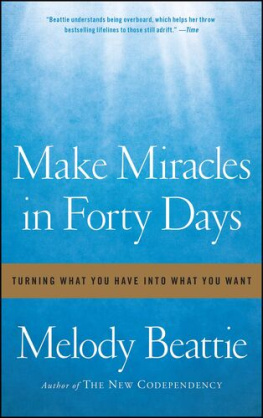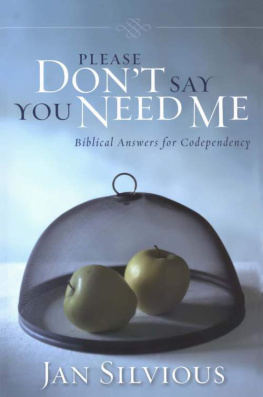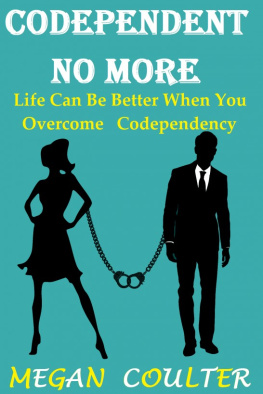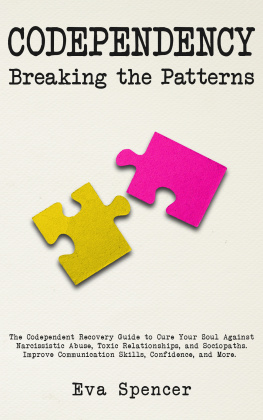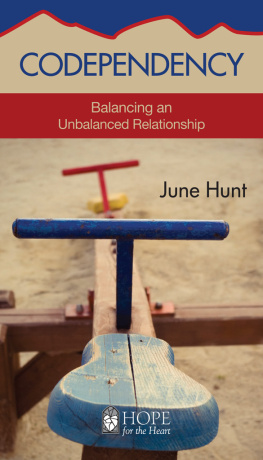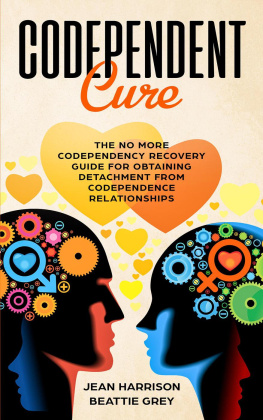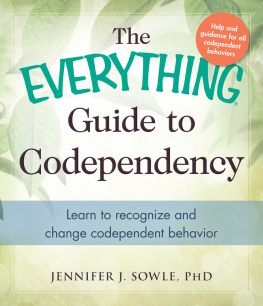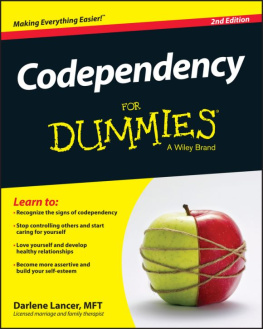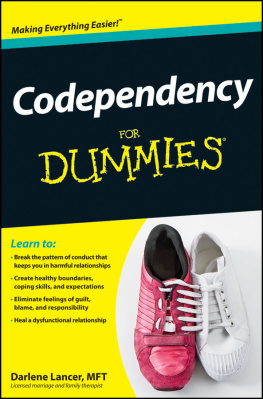Hazelden Publishing
Center City, Minnesota 55012
hazelden.org/bookstore
800-328-9000
2014 by Darlene Lancer
All rights reserved. Published 2014.
Printed in the United States of America
No part of this publication, either print or electronic, may be reproduced in any form or by any means without the express written permission of the publisher. Failure to comply with these terms may expose you to legal action and damages for copyright infringement.
LIBRARY OF CONGRESS CATALOGING-IN-PUBLICATION DATA
Lancer, Darlene.
Conquering shame and codependency : 8 steps to freeing the true you / Darlene Lancer.
pagescm
Includes bibliographical references.
ISBN 978-1-61649-533-6 (paperback) ISBN 978-1-61649-530-5 (e-book)
1. Codependency.2. Interpersonal relationsPsychological aspects. 3. Shame.4. Self-esteem.I. Title.
RC569.5.C63.L36 2014
616.86dc23
2014008694
EDITORS NOTE
The names, details, and circumstances may have been changed to protect the privacy of those mentioned in this publication.
This publication is not intended as a substitute for the advice of health care professionals.
Alcoholics Anonymous and AA are registered trademarks of Alcoholics Anonymous World Services, Inc.
The brief excerpts on pages are from pp. 75, 76 from How People Change by Allen Wheelis. Copyright (c) 1973 by Allen Wheelis. Reprinted by permission of HarperCollins Publishers.
The quote on are adapted from Shame and Pride: Affect, Sex, and the Birth of the Self by Donald L. Nathanson. Copyright (c) 1992 by Donald L. Nathanson. Used by permission of W. W. Norton & Company, Inc.
Cover design: Theresa Jaeger Gedig
Interior design: Cathy Spengler
Typesetting: BookMobile Design and Digital Publisher Services
To the memory of Richard H. Brown and the futures of Jacob, Eliyah, Scarlett, Sloan, and Elisheva
Turnaround
When did you turn left
Instead of turning right?
A long, long time ago
You faded out of sight.
You danced a tune for others eyes
And sang for others ears,
Slowly donning each new guise,
Your own voice waning through the years.
Neglected needs and buried dreams
Secreted by shame,
Truth sacrificed for love,
Still failed to curb the pain.
Up and down the road again,
Attempting to reclaim,
Trying to remember when
You silently forgot your name.
Turn inward love, and listen,
Your own voice faint youll hear.
The only one youve longed to love
Was always waiting near.
By Darlene Lancer 1998, 2014
Contents
Acknowledgments
Im appreciative to Sid Farrar for asking me to write on this important topic, to Peter Schletty for his valuable and thoughtful assistance, and to the Hazelden staff in finalizing this book. Its with deep respect that I acknowledge the painstaking analyses and scholarly treatises of Karen Horney and Silvan Tomkins as well as the invaluable insights of Gershen Kaufman.
Introduction
In 1979, I started attending Al-Anon, a Twelve Step group for family and friends of alcoholics, to help an alcoholic in my life. I was offended when someone said that I had a problem. But beneath my veneer of superiority, in both my professional and my personal life, was a frightened, lost little girl. I was what therapists call codependent, and, like many codependents, I didnt fully trust or value myself or even know who I really was outside of the roles I played. Id given up so much of my real self in my primary relationship that Id become isolated from my friends and family. Id stopped trying new things and didnt take pleasure in activities by myselfI wouldnt even watch television alone! Id lost touch with my feelings and stopped thinking about my needs. Instead, I readily accepted blame for my situation. Bit by bit, I was dying insideso slowly that I didnt notice it.
Despite being unhappy, I was in love, and romance gave me hope that love would make the relationship work and bring me happiness. I was unaware of the cause of my problems and had a bad case of the if onlys if only he would change. But he was addicted to alcohol. Instead of making changes myself, I reacted, daydreamed, and made excuses. Rather than value my needs and set limits, I believed broken promises, rationalized, and continued to accommodate the alcoholic. I worked harder and harder to make the relationship work and become who he wanted or needed me to be. I felt guilty if I didnt measure up to his expectations or how I imagined I should be. It never occurred to me to set boundaries or put my energy into developing myself. I was a textbook example of codependency.
It took time for me to trust Al-Anon, but eventually I understood that I was attending meetings for me. I got to know myself, improved my self-esteem, developed friendships, discovered new activities, and became more assertive. I found the courage to leave that relationship and my profession and to become a marriage and family therapista livelihood more suited to my true self.
Yet even after that relationship ended, my experiences with men continued to belie my conscious belief that my self-worth was now intact and that I deserved love. Although I wasnt being abused, I rationalized settling for less than I needed. I discovered that I lacked kindness toward myself and that I never really felt lovable, even as a child. I had found the enemyand it was me. Shame, along with fears of rejection and abandonment, had ruled me. They caused me to be defensive and to hide, doubt, and judge myself, rather than honor what I truly wanted. Most damaging was that shame had caused me to make poor decisions that had traumatic consequences. In addition, a series of rejections, losses, and health problems revealed the depth of my shame and challenged my will to live. Despite all the gains Id made, I had to dig deeper, examine my beliefs, and heal my shame and codependency from the inside out, one thought at a time.
Helping people uncover and recover their true self and proudly stand up for who they are, without apology, is what Im most passionate about. Its work Ive been doing personally and with clients for decades. I imagined the subtitle for this book to be Loves Silent Killer (the title of chapter 6) because Ive learned that that is what shame is. Shame destroys our dreams and stifles our talents, and as much as we want to love and be loved, it sabotages our relationships. As I researched and wrote Conquering Shame and Codependency, the insidious way shame undermines us became even clearer to me. My work with individuals and couples became more focused and effective. My clients self-awareness, moods, and behaviors exponentially improved. Healing shame is powerful medicine.
Shame and disconnection from our authentic self lie at the core of codependency and addiction. Its as if weve lost our true self, leaving an emptiness filled with anxiety and restlessness. By necessity, our focus becomes externalthe main symptom of codependency. This relieves our pain, but doing so increases our self-alienation, which creates an ever-increasing need to look outside ourselves. This habit becomes a circular, self-perpetuating system that takes on a life of its own.
At times, our thinking becomes obsessive, and our actions become so compelling that they have a compulsive quality we cant control, despite adverse consequences. Twelve Step programs call it self-will run riot. This is why codependency has been referred to as an addiction, even though it doesnt seem as obvious to us as someone unable to stop an addiction to a substance or an activity, like gambling or working. This is our deniala major symptom of codependency and addiction. However, in this book, when I use the term addict, Im referring to alcoholics, gamblers, and other addicts addicted to a substance or activitybut not precluding their codependency.
Next page

